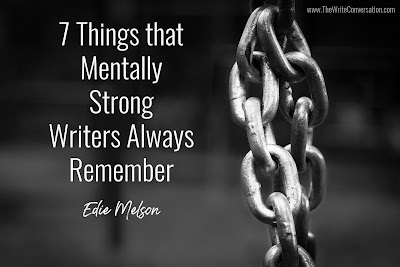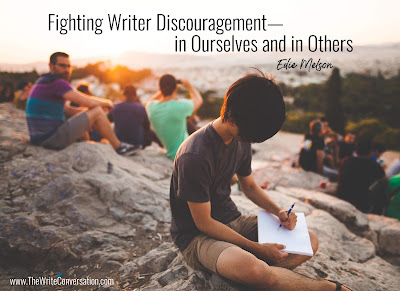Edie Melson's Blog, page 87
June 4, 2023
Writing Strong Heroes - 7 Qualities to Include

By Kristen Hogrefe Parnell @khogrefeparnell
Gilbert Blythe. Mr. Knightly. Mr. Darcy. Doc MacNeill.
That is the short list of strong male heroes who wove themselves into my heart as a teenage reader.
Gilbert Blythe may have called Anne “carrots,” but he did so to get her attention. He was a teasing schoolboy, but he grew to genuinely care about our favorite red-headed heroine.
Mr. Knightly. Where to begin? He was hard on Emma because he loved her, a truth she didn’t realize until much too late.
Mr. Darcy will forever be remembered for his flaw of pride but also for his loyal friendship and generosity that he would never speak of himself.
Doc MacNeill drove me crazy the first time I read Christy, but by the third or fourth reading, he had won me over. He was brave enough to move past his brokenness to love again.
These characters are all different, but they all have one thing in common: They are strong male characters.
And the world needs more of them. We writers must write them.
In honor of Father’s Day this month, let’s recognize seven qualities of strong male characters that matter more than ever in today’s world.
7 Qualities to Include in the Heroes You Write
#1: Flawed but forgiven
There are no such things as “perfect” men. (Same goes for us ladies!) But our flaws make us relatable and become the foundation for future strength we can share with others. Let’s write relatable heroes who show us how to move past failures and how to both extend and receive forgiveness.
#2: Stronger for their weakness
Often, a physical limitation or some other “thorn” they must overcome gives our male characters depth and an opportunity to showcase strength. We Christian fiction writers know that the Source of that strength comes from outside ourselves.
#3: Faith over fear
Whether our male heroes discover faith throughout the story or begin with a faith foundation, they can show us how to choose faith instead of fear.
#4: Sacrificial, not selfish
Does our hero put others before himself—even at great cost? Now there is a model our world needs!
#5: Broken but not beaten
Maybe others broke him. Maybe life circumstances have bruised him. But our hero won’t stay down, and he’ll model how to get back up again.
#6: Masculine, not feminine
In today’s world, masculinity is no longer applauded. However, it should be. Hard pass on anything effeminate. Our heroes know how to be men. Show me the cowboys, green berets, pastors who stand on God’s Word, policemen, firefighters, brave fathers, loyal husbands, and rugged outdoorsmen.
#7: Lost but now loved
Perhaps the most loved character I’ve written to date is a man named Gath. A slave turned cruel Gage enforcer, his journey to faith and his sacrifices along the way show how God can take a lost man and make him beloved.
Who is your favorite fictional hero, and what quality draws you to him so much?
TWEETABLEWriting Strong Heroes - 7 Qualities to Include, tips from author @KHogrefeParnell on @EdieMelson (Click to Tweet)
 Kristen Hogrefe Parnell writes suspenseful fiction from a faith perspective for women and young adults. Her own suspense story involved waiting on God into her thirties to meet her husband, and she desires to keep embracing God’s plan for her life when it’s not what she expects. Kristen’s books have won the Selah Award and the Grace Award, among others, and her inspirational romantic suspense novel, Take My Hand, is now available. An educator at heart, she also teaches English online, enjoys being a podcast guest, and blogs about biblical encouragement for mamas. Kristen lives in the Tampa, Florida area with her husband and baby boy. Connect with her at KristenHogrefeParnell.com.
Kristen Hogrefe Parnell writes suspenseful fiction from a faith perspective for women and young adults. Her own suspense story involved waiting on God into her thirties to meet her husband, and she desires to keep embracing God’s plan for her life when it’s not what she expects. Kristen’s books have won the Selah Award and the Grace Award, among others, and her inspirational romantic suspense novel, Take My Hand, is now available. An educator at heart, she also teaches English online, enjoys being a podcast guest, and blogs about biblical encouragement for mamas. Kristen lives in the Tampa, Florida area with her husband and baby boy. Connect with her at KristenHogrefeParnell.com.Featured Image: Photo by Thomas Lefebvre on Unsplash
Published on June 04, 2023 22:00
June 3, 2023
The Writer’s Critical Choice

by Audrey Frank @AudreyCFrank
Now the word of the Lord came to Jonah the son of Amittai, saying, “Arise, go to Ninevah, that great city, and call out against it, for their evil has come up before me.” But Jonah rose to flee to Tarshish from the presence of the Lord (Jonah 1:1-3).
Then the word of the Lord came to Jonah a second time: “Arise, go to Nineveh, that great city, and call out against it the message that I tell you.” So Jonah arose and went to Nineveh, according to the word of the Lord (Jonah 3:1-2).
…And the people of Nineveh believed God (v.5).
I did not want to share my words. They were mine. My own special place, my own hiding place. Since I can remember, I wrote words out long and lean, sometimes short and fat, always with a force that broke the lead again and again in the orange number two pencils Mom bought me to use for school.
Where do all your pencils go? she’d ask.
It wasn’t until I left for college that she found the hundreds of yellow legal pads I’d stuffed under beds and high on closet shelves, full of words.
Writing was private. Not for others to see.
But that all changed when I moved to a village deep in the bush of Africa where most women could not read or write. They had no private hiding place to wrangle out their words.
One day as I sat under a baobab tree pounding out my hiding-place words, a shepherd girl named Kapili plopped down beside me. Shining from the heat of the day, she leaned back against the rough wood and closed her eyes.
Give me your words, Mama Chizi, she murmured.
I usually “gave my words” on Wednesdays when we had the children’s gathering around my big cowhide drum. Today wasn’t that day. It was my private time, just me and my words. They weren’t for other people, not even a child.
Hard heart, mine.
Come back Wednesday, I replied.
I need them today, she answered.
Begrudgingly (honest heart, mine), I began to tell her the story of another Shepherd, One who left the ninety-nine to go get the one He loved that was lost.
A nasty horsefly buzzed around my head and sunk its needle nose into my neck. I deserved it.
Jesus was a shepherd like me?
I almost missed her question.
Yes, He was. And He loves you so much He’d leave all your brothers and sisters just to go find you if you were lost out in the savannah.
I want to trust Him like you said last week, Mama Chizi. Can I?
Kapili believed that day. All because I shared my words.
Writer, we can flee and hide our words away, or we can arise and go, speaking the words of belief to those who need them. The truth is, God gives us words to share. They don’t really belong to us at all.
What if the words you’re holding today are just what someone needs to believe God?
Lord, give me courage to rise and go, sharing the words You give. Amen.
TWEETABLEThe Writer's Critical Choice, insight and wisdom from author @AudreyCFrank on @EdieMelson (Click to Tweet)
 Audrey Frank is an author, speaker, and storyteller. The stories she shares are brave and true. They give voice to those whose words are silenced by shame, the hard things in life that don’t make sense, and the losses that leave us wondering if we will survive. Audrey and her family have spent over twenty years living and working among different cultures and world views, and she has found that God’s story of redemption spans every geography and culture. He is the God of Instead, giving honor instead of shame, gladness instead of mourning, hope instead of despair. Although she has three different degrees in communication and intercultural studies, Audrey’s greatest credential is that she is known and loved by the One who made her.
Audrey Frank is an author, speaker, and storyteller. The stories she shares are brave and true. They give voice to those whose words are silenced by shame, the hard things in life that don’t make sense, and the losses that leave us wondering if we will survive. Audrey and her family have spent over twenty years living and working among different cultures and world views, and she has found that God’s story of redemption spans every geography and culture. He is the God of Instead, giving honor instead of shame, gladness instead of mourning, hope instead of despair. Although she has three different degrees in communication and intercultural studies, Audrey’s greatest credential is that she is known and loved by the One who made her.Audrey is the author of Covered Glory: The Face of Honor and Shame in the Muslim World (Harvest House Publishers), an outpouring of Audrey’s heart to introduce others to the God of Instead. Shame is not unique to the developing world, the plight of the women behind veils, young girls trafficked across borders; shame is lurking in hearts everywhere. Through powerful stories from women around the world, Covered Glory illuminates the power of the Gospel to remove shame, giving honor instead. Available at favorite booksellers: BARNES & NOBLE , BOOKS A MILLION, AMAZON.
Featured Image: Photo by Angelina Litvin on Unsplash
Published on June 03, 2023 22:00
June 2, 2023
Find Your Writing Team

by Tim Suddeth @TimSuddeth
To comma or not to comma, that was the question. (Sorry, Mr. Shakespeare.)
I was going through my manuscript one last time before sending it to a potential agent. Of course, I wanted it to be perfect, sparkling, and clean. I wanted her to lose herself in the story world with none of the oops that slams you back to reality.
For the last step, I ran it through ProWritingAid and Microsoft Editor. Ah, but there was a problem. When you ask for two opinions . . . Oh my.
Honestly, there were so many times when I would see the orange squiggly line, and it said to add a comma between two independent clauses. Then the blue squiggly would pop up and tell me a comma wasn’t needed.
So, do I pick the blue or orange squiggly for my screen? Who do I listen to?
If you have spoken to me for two minutes, you know English is a second language to me. I grew up speaking and listening to southern country. Ain’t a thang wrong with that, y’all.
Now, that sentence brought out the squigglies.
Was it on I Want To Be a Millionaire where you could phone a friend?
I’ve accepted that I’m more of a storyteller than a grammarian. I follow on the heels of my brother and many of my family members. They were always spinning a good story while we sat out on the porch. I just do it on paper and screen.
Punctuation is a devil I just have to deal with. Thankfully, I don’t have to do it alone. A writing friend recently posted how great it is that our writing community is so open to help each other. In a lot of fields, people are afraid to share their knowledge because someone might get a competitive edge. But writing is different. By lifting someone else, we all get a lift.
Places a Writer Can Go to Get Help
1. Your critique group.
For my first couple of books, I was very fortunate to have a couple of writers who met regularly to go over our works in progress. We would send each other 1500 words or so, then meet later and discuss. From talking to writers more advanced, this is helpful at any stage, but I found it especially helpful as a newer writer.
Not only did we watch for each other’s spelling and punctuation errors, but even more important, it was to hear if the story made sense. Is the reader picturing the story like I want?
We met in person, but you can find many of these groups online.
Just as important as getting critiqued is getting accountability and encouragement. Writing a book takes a long time. Building a blog or a social media presence requires dedication. It’s easy for that inner negative voice to sneak in and tell you, this book doesn’t make sense. Who am I to think I can write anything?
And meeting with a few positive friends, and knowing they expect you to have your submission, is very helpful to get to those wonderful two words: The End.
2. Your Beta Readers.
Beta readers are the first people you let read your manuscript with the purpose of giving the writer helpful feedback. These are usually not your best friend, spouse, or other family member who will tell you that you’re great, or you’re terrible, no matter what you write.
Instead, a beta reader should be someone who reads. That sounds elementary, and to most of our readers, that’s a given. But it might surprise you at how many people do not read books, articles, or blogs but are willing to give advice.
My answer to that is to smile, say that’s interesting, and move on.
They should also be familiar with the type of writing you do, whether it’s devotions, young adult, spec, or Bible study. One size does not fit all.
A beta reader can be very helpful for finding holes in your plot, characters who are flat or don’t appear to have a purpose, and minor story lines that were left hanging.
3. Your writing conferences’ critiques and contests.
You hear a lot about writing conferences on this site. I’m hoping to go to two later this year. Conferences are a great place to meet other writers and learn more about how to write more effectively. You will probably meet people, like you, who spend unreasonable amounts of time staring at screens and shed tears for imaginary people. People who can spend all afternoon doing research and then plan how to go back early the next morning.
But many conferences also give the attender the opportunity to have a portion of your manuscripts critiqued, usually by a faculty member. Often there is a small cost to this, but this is usually well worth it. Look at it as an investment in your writing. It’s easy to read books and blogs with tips on writing. But it is another thing to have a veteran give feedback on your work.
Contests are another way to get feedback and see how you stack up with your peers. Some contests will give feedback on their entries, most of them only give feedback on their finalists or winners. Still, it is a good reason to finish your work and polish it the best you can.
And that is what getting feedback is for, to do the best you can. You will not please everyone. I know, that’s shocking. And sometimes you will get conflicting advice. And they may both be right.
But you are the writer. It’s your work, your byline. You get to make the final decisions. And as one of my friends puts it, you don’t know what you don’t know until you learn.
How will I know what advice to listen to? Will taking the advice improve your writing? Will it make it clearer?
Don’t be afraid to reach out for advice when you need it. Although most of the writing you do, you do alone; you don’t have to do it all by yourself.
TWEETABLEFind Your Writing Team from @TimSuddeth on @EdieMelson (Click to Tweet)
 Tim Suddeth is a stay-at-home dad and butler for his wonderful, adult son with autism. He has written numerous blogs posts, short stories, and three novels waiting for publication. He is a frequent attendee at writers conferences, including the Blue Ridge Mountain Christian Writers Conference and a member of Word Weavers and ACFW. He lives near Greenville, SC where he shares a house with a bossy Shorky and three too-curious Persians. You can find him on Facebook and Twitter, as well as at www.timingreenville.com and www.openingamystery.com.
Tim Suddeth is a stay-at-home dad and butler for his wonderful, adult son with autism. He has written numerous blogs posts, short stories, and three novels waiting for publication. He is a frequent attendee at writers conferences, including the Blue Ridge Mountain Christian Writers Conference and a member of Word Weavers and ACFW. He lives near Greenville, SC where he shares a house with a bossy Shorky and three too-curious Persians. You can find him on Facebook and Twitter, as well as at www.timingreenville.com and www.openingamystery.com.Featured Image: Photo by Priscilla Du Preez on Unsplash
Published on June 02, 2023 22:00
June 1, 2023
Worldbuilding 101 for Writers: Agriculture

by A.C. Williams @ACW_Author
What type of clothing are you wearing right now? Something made from cotton? Maybe polyester? Have you got knitted socks on your feet or shoes made from leather?
What did you have for breakfast today? How about lunch? Or dinner? Is it something from a local restaurant or a chain? Or maybe you visited your local farmer’s market and bought a bunch of fresh produce from a neighbor.
Food and clothing are so essential in everyday life that we don’t often think about them in the context of a story, but even characters in a fantasy world need to eat. And, I really hope they all wear clothes.
What kind of thought have you put into where the food and clothing in your storyworld originates?
So far in this Worldbuilding 101 series, we’ve talked about Existing History, People and Social Circles, Language and Communication, and Climate and Geography. All of these elements of worldbuilding are essential in how you shape a culture, and they should be a huge part of your story itself. This month we’re going to go a little bit deeper into the Climate and Geography conversation, though, because there’s a part of it we don’t really think about when it comes to worldbuilding: Agriculture.
This is why climate and geography matter so much in the conversation. If your storyworld is set high in the mountains, the type of agriculture they will be able to do is going to be limited unless they have trade routes developed with other areas of the country (which is something we will discuss in a few months in Economics). If your storyworld is set on an island, the same thing is true. But if your storyworld is set in a plains area that has access to multiple geographic land types, the way they think about food and textiles will be very different from other more isolated locations.
Food
If your people are on an island, it’s highly likely they’ll have a diet of primarily fish and wild grain. Depending on the location of the island, they may have tropical fruit.
If your people are in the mountains, they’ll probably have a more carnivorous diet with a lot of dairy. Fresh produce will be scarce.
If your people live in space, they’ll be limited further unless you have technology (which we’ll also talk about in a few months) that replicates food or can create food. At one point there was talk of a 3D pizza printer up on the International Space Station.
These are all things you need to consider when you’re building a storyworld. Now, granted, food and meal-type scenes are important in setting the stage and developing certain relationships and sensory details, but they shouldn’t be the focus of your story. The only author I’ve ever seen get away with highly detailed banquet scenes is Brian Jacques in the Redwall series (and I was always so sad that I hadn’t been born a woodland creature so I could drink tea out of an acorn shell).
Clothing and Textiles
Agriculture is an essential part of producing materials for clothing. And if you count livestock as part of agriculture, that includes leather and hides for shoes and other sturdier types of clothing.
Again, climate and geography are massively important with this. People who live in the very far north are going to wear heavy skins and furs of arctic animals, while people who live toward the equator are going to wear clothing that’s light and airy.
If you’re writing apocalyptic steampunk where the atmosphere is poisonous and the rain is acidic, people will need protective clothing to survive outside. So where are those textiles going to come from? These are questions you need to ask, even if you don’t ever explain it in the story itself.
My Favorite Research Tip
That being said, you aren’t limited to the natural climate and geography of a culture when it comes to food and clothing materials or styles. Do your research. Look around in the area where you live.
I live in Kansas, y’all, which is pretty boring on the surface, but we have a huge variety of different cultures living in our fair state. Sure, we have an Amish community that does awesome homestyle cooking, and we have the traditional Midwest meat-and-potatoes fare readily available. But we have some of the best Vietnamese and Lebanese food in the world, and we also have cuisine from El Salvador, Nigeria, Korea, Cuba, Greece, and many other places.
Talk to the people in your circles. Talk to people outside your circles. Make friends with people who are different from you. Be willing to learn how food and clothing work in other cultures, and not only will your story benefit from it, you will too.
TWEETABLEWorldbuilding 101 for Writers: Agriculture from author @ACW_Author on @EdieMelson (Click to Tweet)
Don't Miss the Other Posts in this Series!
PART 1 WORLDBUILDING 101 FOR WRITERS: DO YOU KNOW THE HISTORY OF YOUR STORY WORLD?
PART 2 WORLDBUILDING 101 FOR WRITERS: WRITING PEOPLE GROUPS AND SOCIAL CIRCLES
PART 3 WORLDBUILDING 101 FOR WRITERS: WRITING LANGUAGE AND COMMUNICATION PART 4 WORLDBUILDING 101 FOR WRITERS: CLIMATE AND GEOGRAPHY PART 5 WORLDBUILDING 101 FOR WRITERS: AGRICULTURE
 Award-winning author, A.C. Williams is a coffee-drinking, sushi-eating, story-telling nerd who loves cats, country living, and all things Japanese. She’d rather be barefoot, and if she isn’t, her socks won’t match. She has authored eight novels, two novellas, three devotional books, and more flash fiction than you can shake a stick at. A senior partner at the award-winning Uncommon Universes Press, she is passionate about stories and the authors who write them. Learn more about her book coaching and follow her adventures online at https://www.amycwilliams.com.
Award-winning author, A.C. Williams is a coffee-drinking, sushi-eating, story-telling nerd who loves cats, country living, and all things Japanese. She’d rather be barefoot, and if she isn’t, her socks won’t match. She has authored eight novels, two novellas, three devotional books, and more flash fiction than you can shake a stick at. A senior partner at the award-winning Uncommon Universes Press, she is passionate about stories and the authors who write them. Learn more about her book coaching and follow her adventures online at https://www.amycwilliams.com.
Published on June 01, 2023 22:00
May 31, 2023
How to Get Back in the Writing Groove

by Lynn H. Blackburn @LynnHBlackburn
A writer friend recently posted this question on Instagram: “Any tips on how to jump back in when you haven’t written in a while?”
And y’all…I didn’t realize how many thoughts I had on the subject until I started to reply.
Apparently, I have a lot of thoughts and some strong opinions.
I also have over a decade’s worth of experience because I am the kind of writer who takes breaks between projects. ( I wrote about this in April here at The Write Conversation ). Which means I frequently find myself having to “jump back in” after not writing for a while.
But even if you aren’t like me, and you typically write with consistency and focus, there will be times in your life when you will have to take a break.
Hopefully these times will usually be joyous—weddings, babies, graduations, travel, new opportunities. All of these are wonderful but can come with the unintended consequence of days (weeks, months) away from the manuscript.
Sadly, sometimes the reasons are painful. Death, illness, accidents, broken relationships, loss of employment…I could go on, but you don’t need me to do that. You know. In fact, you’ve already filled in the blank with your own hard. I get it.
Regardless of what kept you away from the words, sooner or later, they will call you back. When they do, I have a few suggestions to help you get started.
Tips for Finding Your Writing Rhythm Again:
First: Accept that it will be painful. Don’t freak out when you sit down to write, and the words don’t flow. You have to work through it. It’s going to be extremely unpleasant. These are facts. Breathe in, breathe out, and keep writing.Second: For the first few days (maybe even weeks) that you’re back in your writing world, do not attempt any kind of massive writing day. Do you typically write 1K? Shoot for 300-500 words and be happy with that! This is not the time to try for a 10K day. No. Nope. Don’t do it! You very well may be so far behind that you’re in danger of missing your deadline but trust me. Going for a huge word count right out of the gate is a recipe for disaster. Start slow. Third: Be as consistent as possible when you start writing again. If you’re shooting for 300 words a day, try to get them as many days in a row as possible and then ramp up from there.Fourth: When you think you’re back on the wagon, but fall off again, do not panic. Don’t beat yourself up. Be honest about your life situation. Are you a mom with babies? A caregiver? On forced overtime at work? A mom of teenagers (because seriously, how did I not know how much time I would spend in the car chauffeuring these people around!)? Is your health an issue? Finances? Are you working on your marriage or restoring a relationship with a sibling? Acknowledge your current life status and recognize that you have some real uphill battles that make writing consistently a challenge. That does not make you a failure as a writer. Fifth: Begin again. And again. And again. As many times as it takes. It will hurt. You’ll be tempted to panic. But when you keep going and keep starting over as often as you need to, eventually you’ll realize that the hard writing days while you find your rhythm are just part of the process. And the next time you start over (because yes, there will be a next time) you’ll be less likely to panic. Note: I didn’t say you won’t panic. Just that it will be less likely. :)
If you have more tips to share, I’d love to hear them. Especially since I turned revisions in to my editor on May 3rd and haven’t written a word of fiction since. So, it looks like I will get to practice what I preach when I jump back in this month!
Grace and peace,Lynn
TWEETABLEHow to Get Back in the Writing Groove from author @LynnHBlackburn on @EdieMelson (Click to Tweet)
 Lynn H. Blackburn loves writing romantic suspense because her childhood fantasy was to become a spy, but her grown-up reality is that she's a huge chicken and would have been caught on her first mission. She prefers to live vicariously through her characters and loves putting them into all kinds of terrifying situations while she's sitting at home safe and sound in her pajamas!
Lynn H. Blackburn loves writing romantic suspense because her childhood fantasy was to become a spy, but her grown-up reality is that she's a huge chicken and would have been caught on her first mission. She prefers to live vicariously through her characters and loves putting them into all kinds of terrifying situations while she's sitting at home safe and sound in her pajamas! Unknown Threat, the first book in her Defend and Protect series, was a 2021 Christy Award finalist and her previous titles have won the Carol Award, the Selah Award, and the Faith, Hope, and Love Reader’s Choice Award. Malicious Intent, the second book in the series, released March 2022.
She is a frequent conference speaker and has taught writers all over the country. Lynn lives in South Carolina with her true love and their three children. You can follow her real life happily ever after by signing up for her newsletter at LYNNHBLACKBURN.COMand @LynnHBlackburn on BOOKBUB, FACEBOOK, TWITTER, PINTEREST, and INSTAGRAM.
Published on May 31, 2023 22:00
May 30, 2023
21 Bible Verses to Use to Pray for Your Writing

by Edie Melson @EdieMelson
Anyone who knows me, knows that I only have one hard and fast rule about writing:
Pray before my fingers hit the keys!
While some of the things we pray are obvious, some aren’t. Today I’m sharing other things to pray that you may not have considered.
21 Bible Verses to Pray for Your Writing
1. Thank God for the gift of writing He’s giving you. Every good gift and every perfect gift is from above, coming down from the Father of lights with whom there is no variation or shadow due to change. James 1:17
2. Ask God to give you a joyful heart in the midst of difficulty. Rejoice in hope, be patient in tribulation, be constant in prayer. Romans 12:12
3. Ask God to give you clarity of mind. I will instruct you and teach you in the way you should go; I will counsel you with my eye upon you. Psalm 32:8
4. Ask God to help you let go of expectations and fix your eyes on Him. Set your minds on things that are above, not on things that are on earth. Colossians 3:2
5. Ask God to keep you from growing weary as you work. And let us not grow weary of doing good, for in due season we will reap, if we do not give up. Galatians 6:9
6. Ask God to give you the rest you need. Come to me, all who labor and are heavy laden, and I will give you rest. Take my yoke upon you, and learn from me, for I am gentle and lowly in heart, and you will find rest for your souls. For my yoke is easy, and my burden is light.” Matthew 11:28-30
7. Ask God to protect you from your own heart the cruel words we all say to ourselves. The heart is deceitful above all things, and desperately sick; who can understand it? Jeremiah 17:9
8. Ask God to help you know what to keep and what to change. Therefore, this is what the Lord says: “If you return, then Iwill restore you— You will stand before Me; And if you extract the precious from the worthless, You will become Myspokesman. They, for their part, may turn to you, But as for you, you are not to turn to them. Jeremiah 15:19
9. Ask God to give you the faith to fulfil His purpose in your writing. For we are his workmanship, created in Christ Jesus for good works, which God prepared beforehand, that we should walk in them. Ephesians 2:10
10. Ask God to protect you from the hurtful words of others. No weapon that is fashioned against you shall succeed, and you shall confute every tongue that rises against you in judgment. This is the heritage of the servants of the Lord and their vindication from me, declares the Lord.” Isaiah 54:17
11. Ask God to give you strength. I can do all things through him who strengthens me. Philippians 4:13
12. Ask God to give you the patience you need to wait on His timing with your words. But they who wait for the Lord shall renew their strength; they shall mount up with wings like eagles; they shall run and not be weary; they shall walk and not faint. Isaiah 40:31
13. Ask God to provide others to walk this path with you. Two are better than one, because they have a good reward for their toil. Ecclesiastes 4:9
14. Ask God to help you learn what you need to learn. If any of you lacks wisdom, let him ask God, who gives generously to all without reproach, and it will be given him. James 1:5
15. Ask God to give you friends who will speak the hard truth. Iron sharpens iron, and one man sharpens another. Proverbs 27:17
16. Ask God to put others in your path for you to encourage. Therefore encourage one another and build one another up, just as you are doing. 1 Thessalonians 5:11
17. Ask God to give you discernment as you gather writing friends. Whoever walks with the wise becomes wise, but the companion of fools will suffer harm. Proverbs 13:20
18. Ask God to keep you from anxiety about any aspect of your writing life. Do not be anxious about anything, but in everything by prayer and supplication with thanksgiving let your requests be made known to God. Philippians 4:6
19. Ask God to give you the courage you need to stay the course. Have I not commanded you? Be strong and courageous. Do not be frightened, and do not be dismayed, for the Lord your God is with you wherever you go.” Joshua 1:9
20. Ask God to protect you from jealousy and give you a generous heart for others’ success. A tranquil heart gives life to the flesh, but envy makes the bones rot. Proverbs 14:30
21. Ask God to use your words in ways beyond what you can hope or imagine. Now to him who is able to do far more abundantly than all that we ask or think, according to the power at work within us Ephesians 3:20
These are the things I pray regularly for my writing and for my friends who are writers.
I'd love to hear what you would add to the list. Please leave your suggestions—along with a Bible verse—in the comments section below!
Don't forget to join the conversation!Blessings,Edie
TWEETABLE21 Bible Verses to Use to Pray for Your Writing from author @EdieMelson (Click to Tweet)
 Edie Melson is a woman of faith with ink-stained fingers observing life through her camera lens. She’s a writer who feels lost without that device & an unexpected speaker who loves to encourage an audience. She also embraces the ultimate contradiction of being an organized creative. She knows the necessity of Soul Care and leads retreats, conferences & workshops around the world on staying connected to God. Her numerous books, including the award-winning Soul Careseries & reflect her passion to help others develop the strength of their God-given gifts. Her blog, The Write Conversation is recognized as one of the top 101 industry resources.
Edie Melson is a woman of faith with ink-stained fingers observing life through her camera lens. She’s a writer who feels lost without that device & an unexpected speaker who loves to encourage an audience. She also embraces the ultimate contradiction of being an organized creative. She knows the necessity of Soul Care and leads retreats, conferences & workshops around the world on staying connected to God. Her numerous books, including the award-winning Soul Careseries & reflect her passion to help others develop the strength of their God-given gifts. Her blog, The Write Conversation is recognized as one of the top 101 industry resources. She and husband Kirk have been married 40+ years and raised three sons. They live in the foothills of the Blue Ridge Mountains and can often be found hiking—with Edie clinging to the edge of a precipice for the perfect camera angle and Kirk patiently carrying her camera bag and tripod. Connect with her on her website, www.EdieMelson.com and through social media.
Featured Image: Photo by Timothy Eberly on Unsplash
Published on May 30, 2023 22:00
May 29, 2023
7 Things that Mentally Strong Writers Always Remember

by Edie Melson @EdieMelson
Pursuing the craft of writing as a calling and/or a career can be an incredibly rewarding path through life. It can also be equally difficult. When we create something and then offer it up to the world, we open ourselves up to criticism and judgement. The painful things said about what we write is an inescapable part of being a writer.
Navigating a world filled with criticism can be exhausting—if we’re not prepared. That’s what this post is about—strengthening our minds in regard to our writing.
7 Practices of a Mentally Strong Writer
1. Know why you write. For me it’s two-fold. First, I write because that’s the way God designed me to process the world. When I write out my difficulties or questions, I find answers. Second, I write because I believe there was a moment in time when God called me to write for Him. To me, that means using my writing to honor Him and bless others.
2. Pray regularly. This leads to my ONE and only hard-and-fast-rule-of-writing. Always pray before your fingers hit the keys, pick up a pen or even touch the text pad. In the world today our words go farther and faster than we ever imagined would be possible. That makes it even more critical that those words should first be submitted to God before we send them out.
3. Keep your defense close at hand. As a believer who writes, the only critique that should matter is what God says about my writing. So I keep a list of Bible verses that I’ve claimed in regard to my writing close at hand. Here are three of my favorites:Therefore, this is what the Lord says: “If you return, then I will restore you— You will stand before Me; And if you extract the precious from the worthless, You will become My spokesman. They, for their part, may turn to you, But as for you, you are not to turn to them. Jeremiah 15:19 NASB Now faith is confidence in what we hope for and assurance about what we do not see. Hebrews 11:1 NIV For the gifts and the calling of God are irrevocable [for He does not withdraw what He has given, nor does He change His mind about those to whom He gives His grace or to whom He sends His call]. Romans 11:29 Amplified Bible4. Resolve to consider. When I hear something difficult about what I’ve written, my first instinct is to leap to defense. I’ve learned that a better response—and one that reduces my stress level—is to consider what being said. I can ultimately reject it, but if I consider it, I can pull anything valuable out of the criticism without discarding it in anger.
5. Enlist a community of other writers. It’s almost impossible to do this writing life alone. My writing friends understand a difficult day at the keyboard, a bad review, and the ultimate joy of publication. My other friends, who don’t write, celebrate with me and are great encouragers, but they do not know the path I walk.
6. Stay humble and acknowledge there are always things that must be learned. When I was a young (in experience years) writer, I thought those far ahead of me had actually arrived. Now I know there is never such a thing as having arrived as a writer. When we commit to being a writer we commit to a life of learning. And often times lifelong re-learning. The world is changing and even experienced writers are constantly readjusting. Being careful to live through each situation as someone ready to be taught, instead of someone who knows the answer will save a huge amount of heartache.
7. Decide now who gets to speak truth in regard to writing. There are always plenty of people ready to tell you who, what, when, where, why and how to do what you do. Some of the advice will be good and some…well…not so good. Instead of treating everything as truth, decide those few you’ll accept advice from. This doesn’t mean you’ll dismiss everyone else, just weigh what you hear from anyone outside your trusted guard.
Bottom LineBe equipping ourselves as writers we will be able to stand when life gets hard. We will also have some side benefits.
Along with the strength comes:Assurance. Not really assurance in myself, but in God and the fact that He is directing my steps. More than that, I know for certain that if I get off the track, He will gently guide me back where I should be.Peace. By developing this strength, I can have peace when the difficult words come. I know where to go for truth and how to reject the lies. Joy. All of this brings me the ability to experience incredibly joy in the gift of writing God has given me.Now it's your turn. What would you add to my list to help us become mentally strong writers? Remember, we're all stronger together, so don't hesitate to share!
Don't forget to join the conversation!Blessings,Edie
TWEETABLE7 Things that Mentally Strong Writers Always Remember from @EdieMelson (Click to Tweet)
 Edie Melson is a woman of faith with ink-stained fingers observing life through the lens of her camera. She’s a writer who feels lost without her camera and a reluctant speaker who loves to encourage an audience. And she embraces the ultimate contradiction of being an organized creative. As an author, she knows the necessity of Soul Care and leads workshops around the country on staying connected to God. Her numerous books, including the award-winning Soul Care series andUnruffled, Thriving in Chaos reflect her passion to help others develop the strength of their God-given gifts and apply them to their lives.
Edie Melson is a woman of faith with ink-stained fingers observing life through the lens of her camera. She’s a writer who feels lost without her camera and a reluctant speaker who loves to encourage an audience. And she embraces the ultimate contradiction of being an organized creative. As an author, she knows the necessity of Soul Care and leads workshops around the country on staying connected to God. Her numerous books, including the award-winning Soul Care series andUnruffled, Thriving in Chaos reflect her passion to help others develop the strength of their God-given gifts and apply them to their lives. Edie is the director of The Blue Ridge Christian Writers Conference, popular speaker a numerous conferences, and a board member of the Advanced Writers and Speakers Association. Connect with her on www.EdieMelson.com and through social media.
Featured Image: Image by Maaark from Pixabay
Published on May 29, 2023 22:00
May 28, 2023
Fighting Writer Discouragement--in Ourselves and in Others

by Edie Melson @EdieMelson
Writing is often feels a solitary pursuit. Truthfully, it’s the successful writers who know better than to try to go it alone. Writing in a vacuum is not a good idea—for a lot of reasons. It’s easy to lose perspective and either believe what you’re writing is perfect, or worse, that it’s junk. Having others who share the same struggles make us stronger.
Not to mention the fact that they can talk us down when we’re standing on a writing ledge. Writers can encourage Writers like no one else can. That’s what I want to share today.
Writers Encouraging Writers
1. Success has nothing to do with perfection. So often we try to make our writing perfect. It’s fine to shoot for excellence, but perfect is never going to happen. Quit beating yourself up for not reaching it.
2. Every writer’s journey is different. Writers are masters at comparison. We try to judge our own worth by what others have or have not accomplished. We need to look within, not without when measuring our success.
3. Quit being so hard on yourself. We are our own worst critics. We allow the negative voices in our heads free reign. It’s time to replace those harsh words with kind ones.
4. Courage isn’t the absence of fear. All writers struggle with fear—fear of failure, fear of not being good enough, fear of success. The key is to fight. Don’t give up, don’t give in.
5. Nothing lasts forever. This is even true for writers. There are good days, bad days, great days, and days when we want to give up. Remember that the ups and downs will happen, and this too shall pass.
6. It takes as long as it takes. So often we want success to be a part of a formula. The truth is, like I said on #2, every writer’s journey is different.
7. Sometimes you have to write through the junk to get to the jewels. We all want our writing path to be a continuous, unbroken line of improvement. The truth is far from that. There will be days, weeks, and even months where it’s more of a two steps forward and three steps back.
8. Failure is an option. More often than not it’s also the shortest path to success. Learn from your mistakes, isn’t just a cliché, it’s a truth. Don’t beat yourself up when you fail, learn what you can and keep moving forward.
9. Writing is a journey, not a destination. When we get started on the writing road, we mistake milestones for destinations. It’s easy to think there’ll be a time when we’ve arrived. Truthfully, that never happens. Each achievement is just a gateway to the next part of our writing journey.
10. Nobody writes a perfect first draft. The genius of writing comes in the rewriting. Don’t let a mediocre start keep you from finishing strong.
These are some of the things that my writing buddies have said to me when I was standing on a metaphorical ledge, about to jump. I’d love to know what you’d add to the list.
Don’t forget to join the conversation!Blessings,Edie
TWEETABLEFighting Writer Discouragement—in Ourselves and in Others from author @EdieMelson (Click to Tweet)
 Edie Melson is a woman of faith with ink-stained fingers observing life through the lens of her camera. No matter whether she’s talking to writers, entrepreneurs, or readers, her first advice is always “Find your voice, live your story.” As an author, blogger, and speaker she’s encouraged and challenged audiences across the country and around the world. Her numerous books reflect her passion to help others develop the strength of their God-given gifts and apply them to their lives. Connect with her on her website, through Facebook, Twitter, and Instagram.
Edie Melson is a woman of faith with ink-stained fingers observing life through the lens of her camera. No matter whether she’s talking to writers, entrepreneurs, or readers, her first advice is always “Find your voice, live your story.” As an author, blogger, and speaker she’s encouraged and challenged audiences across the country and around the world. Her numerous books reflect her passion to help others develop the strength of their God-given gifts and apply them to their lives. Connect with her on her website, through Facebook, Twitter, and Instagram.
Published on May 28, 2023 22:00
May 27, 2023
Encouragement for Writers Who Feel Redundant

by Edie Melson @EdieMelson
Then we���ll be a choir���not our voices only, but our very lives singing in harmony in a stunning anthem to the God and Father of our Master Jesus! (Romans 15:6 The Message).
I get the opportunity to talk to a lot of writers. And we all have one big thing in common���insecurity.
It���s actually a trait I see in a lot of people, not only writers. I used to struggle, wondering how someone with as little to offer as me could make a difference in this world. I mean, as a writer who���s a Christian, how could I be as impactful as others who are already having an impact. Why would God even need me?
There are lots of logical arguments for and against this lack of confidence. But, for me, none of them ever helped. None of them explained why God would use me when He has so many more qualified. Really does the world need one more Christian writer or blogger, or am I just adding to the noise.
I finally got smart and one morning, during my quiet time, took the question to God. I wanted Him to either confirm His calling on my life or not. Here's what God had to say, not in literal words, but in a new way of thinking about my concern of adding to the noise in the world.
He used the analogy of a choir.
He showed me that He has thousands of voices out there who are His choir. And as in musical choir, the music is more beautiful with more than one soprano or more than one alto. The same holds true with the chorus He���s put together to spread His message. He uses thousands of us, many with the same message, but a unique voice to make up the sections of His choir. He assured me that while I may not be a soloist, He still misses me when I'm not there.
I'm one voice, but when He directs, the music is divine!
A Prayer About Letting My Faith Sing
Sing to him, sing praise to him; tell of all his wonderful acts (Psalm 105:2 NIV).
Dear Lord, why would you choose to use someone like me? There are others who are more eloquent in their writing, more wise in their application, and have more experience. My audience is precious, but tiny. I don���t feel like there���s anything unique about what I have to say.
I am thrilled to feel Your call on my life���to think that You may have designed me for such a time as this. But it feels like all I have to say has been said before. I worry that I may have missed the message You intended me to share. Why do You need one more person saying the same thing?
Give me confirmation that I���m on the right path. Show me how my message can impact Your kingdom. I���m not asking for a huge audience, I���m happy where I am, as long as I���m in the middle of Your will. Don���t let me grow discouraged. Instead keep me steadfast and firm in all You���ve called me to do.
Blessings,Edie
TWEETABLEEncouragement for Writers Who Feel Redundant from author @EdieMelson (Click to Tweet)
*reprinted from Soul Care for Writers with permission from Bold Vision Books, Inc.
 Edie Melson is a woman of faith with ink-stained fingers observing life through the lens of her camera. No matter whether she���s talking to writers, entrepreneurs, or readers, her first advice is always ���Find your voice, live your story.��� As an author, blogger, and speaker she���s encouraged and challenged audiences across the country and around the world. Her numerous books reflect her passion to help others develop the strength of their God-given gifts and apply them to their lives. Connect with her on her WEBSITE, through FACEBOOK, TWITTER, and INSTAGRAM.
Edie Melson is a woman of faith with ink-stained fingers observing life through the lens of her camera. No matter whether she���s talking to writers, entrepreneurs, or readers, her first advice is always ���Find your voice, live your story.��� As an author, blogger, and speaker she���s encouraged and challenged audiences across the country and around the world. Her numerous books reflect her passion to help others develop the strength of their God-given gifts and apply them to their lives. Connect with her on her WEBSITE, through FACEBOOK, TWITTER, and INSTAGRAM.Featured Image: Edie Melson www.EdieMelson.com
Published on May 27, 2023 22:00
May 26, 2023
Have a Productive Summer Writing by Incorporating These 4 Tips into Your Routine

by Zena Dell Lowe @ZenaDellLowe
I hope you’re making progress on your current writing project, in spite of the fact that it’s summer. This season can make it difficult to stay on task for a number of very good reasons:
The distractions of children being home all day instead of at schoolThe lure of the great outdoors with its cheery sunshine and smelly goodnessThe increased responsibilities that you must undertake because it’s summer, yo!
In other words, summertime can make it difficult for you to keep up with whatever current disciplines you may have in place that allow you to keep on writing.
4 Tips to Help Make This a Productive Writing Summer
1. Consider moving your writing time to a different time of day
If you know your days are going to be full of various responsibilities and tasks, then purpose in your heart to wake up earlier or stay up later than everyone else in the household. The good news is that summer actually makes it easier to do this. It gets lighter sooner and gets dark later, and there’s something about the season that prompts humans to want to stay up longer! Of course, the morning option would be my first choice since that’s when you’ll be the freshest, and if you have children, then this may be the only time of day when you’re likely to have some alone time. But no matter what time of day works for you, the point is to carve out some time when the rest of the household is relatively quiet. The main thing is to keep up the discipline of daily writing, even if the time of day changes.
2. Consider temporarily reducing how much time you’ve set aside to write
If you already have a dedicated writing time each day but you’re worried about how you’ll be able to keep it up given your increased responsibilities, one thing you can do is keep the appointment, but reduce the total amount of time you write. This allows you to keep the habit in place, which is essential, while also allowing you to accommodate your new and busy schedule guilt-free. Once fall comes along, it’ll be easy for you to simply add more time to this already established time frame – and in fact, you’ll find yourself eager to do so.
3. Consider moving your workspace to the great outdoors
If you’re like me and the idea of sitting indoors when it’s gorgeous outside fills you with dread, then consider setting up your “office” outside during these precious summer months. Being outside in nature is a healthy desire. It may even feed your imagination in surprising ways. Obviously, you’ll want a space that provides shade and/or some other means of keeping cool, and allows as few distractions as possible. But being outside can be a wonderful change of venue that can actually inspire the imagination and refresh the soul.
4. Switch your focus to an online course or work with a coach
Another way to stay productive during summer months is to take an online course or to work with a coach. These two options will usually force you to keep writing and stay on task. Even if your focus changes temporarily (so that you’re focusing on acquiring and improving your skills rather than completing a specific project), this is still a way to keep up momentum. Sometimes, it’s even a BETTER use of our time, since ideally we’ll end up with better skills.
The point is that sometimes it’s just too difficult to keep up with your writing regimen given the distractions of summer, but you can still stay productive by turning your focus to a different aspect of writing that will improve your craft and feed your creativity. If this idea strikes your fancy, feel free to check out The Storyteller’s Mission website, where we currently have two classes available for a ridiculously low discount price, including Zena’s conference workshop series, Hollywood Storytelling Tools, and her class for screenwriters, Formatting as an Artform. To learn more about either of these two classes, check out the website at https://www.thestorytellersmission.com/classes.
It's not too late to make 2023 your best writing year yet! All you have to do is stay productive.
TWEETABLEHave a Productive Summer Writing by Incorporating These 4 Tips into Your Routine from @ZenaDellLowe on @EdieMelson (Click to Tweet)
 Zena has worked professionally in the entertainment industry for over 20 years as a writer, producer, director, actress, and story consultant. Zena also teaches advanced classes on writing all over the country. As a writer, Zena has won numerous awards for her work. She also has several feature film projects in development through her independent production company, Mission Ranch Films. In addition to her work as a filmmaker, Zena launched The Storyteller’s Mission with Zena Dell Lowe, a podcast designed to serve the whole artist, not just focus on craft. In 2021, Zena launched The Storyteller’s Mission Online Platform, where she offers advanced classes and other key services to writers. Zena loves story and loves to support storytellers. Her passion is to equip artists of all levels to achieve excellence at their craft, so that they will truly have everything they need to change the world for the better through story.
Zena has worked professionally in the entertainment industry for over 20 years as a writer, producer, director, actress, and story consultant. Zena also teaches advanced classes on writing all over the country. As a writer, Zena has won numerous awards for her work. She also has several feature film projects in development through her independent production company, Mission Ranch Films. In addition to her work as a filmmaker, Zena launched The Storyteller’s Mission with Zena Dell Lowe, a podcast designed to serve the whole artist, not just focus on craft. In 2021, Zena launched The Storyteller’s Mission Online Platform, where she offers advanced classes and other key services to writers. Zena loves story and loves to support storytellers. Her passion is to equip artists of all levels to achieve excellence at their craft, so that they will truly have everything they need to change the world for the better through story.To find out more about Zena or her current courses and projects, check out her websites at WWW.MISSIONRANCHFILMS.COM and WWW.THESTORYTELLERSMISSION.COM
Featured Image: Image by Katharina N. from Pixabay
Published on May 26, 2023 22:00



